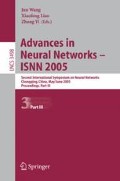Abstract
Due to the NP-hard complexity, the path planning problem may perhaps best be resolved by stochastically searching for an acceptable solution rather than using a complete search to find the guaranteed best solution. Most other evolutionary path planners tend to produce jagged paths consisting of a set of nodes connected by line segments. This paper presents a novel path planning approach based on AppART and Particle Swarm Optimization (PSO). AppART is a neural model multidimensional function approximator, while PSO is a promising evolutionary algorithm. This path planning approach combines neural and evolutionary computing in order to evolve smooth motion paths quickly. In our simulation experiments, some complicated path-planning environments were tested, the result show that the hybrid approach is an effective path planner which outperforms many existing methods.
Access this chapter
Tax calculation will be finalised at checkout
Purchases are for personal use only
Preview
Unable to display preview. Download preview PDF.
References
Hwang, Y.K., Ahuja, N.: Gross Motion Planning - A Survey. ACM Computing Survey 24, 219–291 (1992)
Latombe, J.C.: Robot Motion Planning. Kulwer Academic publishers, Boston (1991)
Shibata, T., Fukuda, T., Kosuge, K., Arai, F.: Selfish and Coordinative Planning for Multiple Mobile Robots by Genetic Algorithm. In: Proc. of the 31st Conf. on Decision and Control, vol. 3, pp. 2686–2691 (1992)
Leung, C.H., Zalzala, A.M.S.: A Genetic Solution for the Motion of Wheeled Robotic Systems in Dynamic Environments. In: Int. Conf. on Control, vol. 1, pp. 760–764 (1994)
Trojanowski, K., Michalewicz, Z., Xiao, J.: Adding Memory to the Evolutionary Planner/Navigator. In: Proc. of the 4th IEEE ICEC, pp. 483–487 (1997)
Gerke, M.: Genetic Path Planning for Mobile Robots. In: Proc. of the American Control Conference, vol. 4, pp. 2424–2429 (1999)
Martí, L., Policriti, A., García, L.: AppART: An ART Hybrid Stable Learning Neural Network for Universal Function Approximation. In: Hybrid Information Systems, pp. 93–120. Springer, Heidelberg (2002)
Kennedy, J., Eberhart, R.: Particle Swarm Optimization. In: Proc IEEE Int. Conf. Neural Networks, Perth, Australia, pp. 1942–1948 (1995)
Mendes, R.C., Rocha, P.M., Neves, J.: Particle Swarms for Feedforward Neural Network Training. In: Proc. Int. Joint Conf. Neural Networks, pp. 1895–1899 (2002)
Author information
Authors and Affiliations
Editor information
Editors and Affiliations
Rights and permissions
Copyright information
© 2005 Springer-Verlag Berlin Heidelberg
About this paper
Cite this paper
Tang, J., Zhu, J., Sun, Z. (2005). A Novel Path Planning Approach Based on AppART and Particle Swarm Optimization. In: Wang, J., Liao, XF., Yi, Z. (eds) Advances in Neural Networks – ISNN 2005. ISNN 2005. Lecture Notes in Computer Science, vol 3498. Springer, Berlin, Heidelberg. https://doi.org/10.1007/11427469_40
Download citation
DOI: https://doi.org/10.1007/11427469_40
Publisher Name: Springer, Berlin, Heidelberg
Print ISBN: 978-3-540-25914-5
Online ISBN: 978-3-540-32069-2
eBook Packages: Computer ScienceComputer Science (R0)

